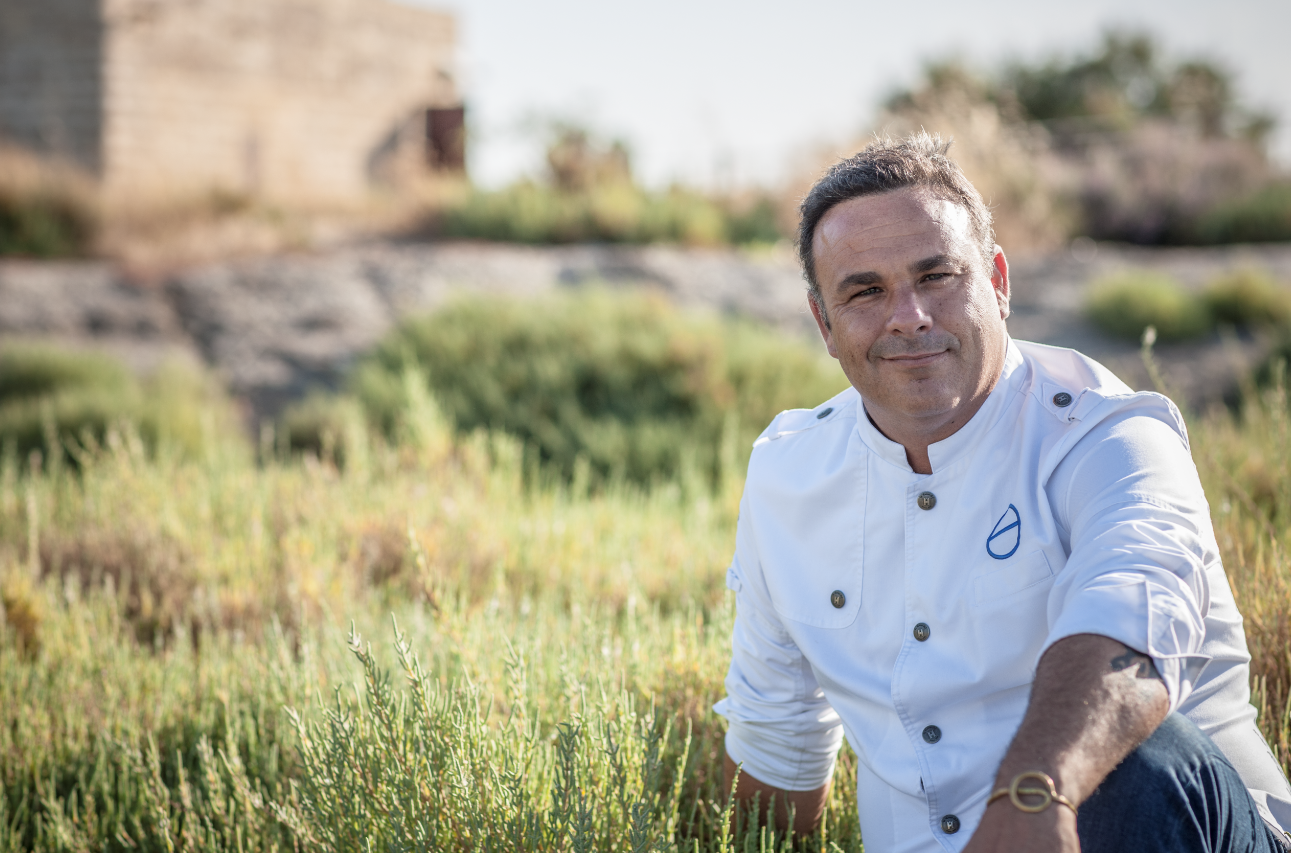
Ángel León
LA COCINA MARINERA DEL S. XXI
Ángel León, cuatro Estrellas Michelin, tres Soles en la Guía Repsol, reconocimiento a nivel mundial… ¿cómo se lleva ese éxito en lo personal para seguir siendo cercano y humilde?
Tener cuatro Estrellas Michelin la verdad que es algo que nunca había pensado ni en mis mejores sueños cuando empezaba… los éxitos y los reconocimientos son sin duda un aliciente para seguir navegando, pero no los siento como míos sino de mi tripulación,
y por ello me ilusionan más. La suma de muchos esfuerzos es lo que hace posible este proyecto. Aponiente desde sus inicios siempre quiso ser algo más que un restaurante y su dimensión ha ido transcendiendo con el paso de los años, pero nosotros seguimos siendo los mismos, gente de aquí, de lo nuestro, que apostamos por hipotecarnos en nuestra tierra, apostolando Cádiz y las bondades de Andalucía, cuando a lo mejor lo más fácil o lo más rentable hubiese sido coger los cuchillos y navegar en otros mares…
Mi conexión con los míos, con mi gente, mi entorno y mi realidad es lo que me hace tener los pies en la tierra y la cabeza en el mar…
¿Cómo de importante es para usted la sostenibilidad en la alimentación?
Ha sido así desde mis inicios… mi apuesta por el descarte, por ejemplo, viene prácticamente desde que abrimos las puertas de Aponiente, cuando empezamos a desarrollar el proyecto de los embutidos marinos que se ha ido diversificando con el paso de los años. Creo que actualmente la sostenibilidad está en ese punto de convertirse en palabra trending topic, pero desde Aponiente venimos defendiéndola e intentando preservar nuestro entorno más afín (marismas, esteros, almadraba, salinas…) desde
nuestros comienzos. El mundo tiene que seguir por esa línea y
nosotros desde aquí perseverando y difundiendo la conservación
de nuestros mares.
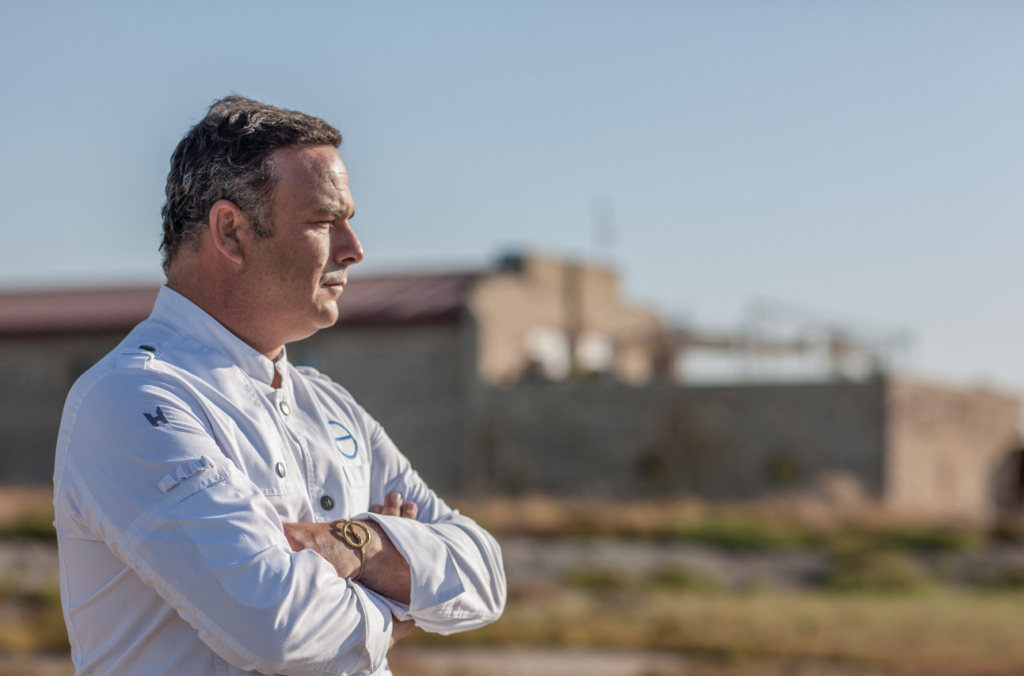
¿Está siendo benévola con nosotros la naturaleza, pese al daño que le estamos haciendo con los plásticos, basuras… etc.?
Tenemos que tomar conciencia, interiorizar el mensaje y de verdad cambiar nuestros hábitos… es un problema de educación, desde la base. Creo que a la naturaleza en este confinamiento le hemos dado un respiro y en algo se ha notado. Tendríamos que valorarlo. La naturaleza y sus dones son un regalo que debemos de cuidar, desconocemos el 40% de la despensa marina, no nos lo carguemos antes de llegar a conocer todo lo que nos puede ofrecer
¿Se considera primero marinero y después cocinero? ¿Si no se
llega a enamorar del mar, hoy sería cocinero?
Primero fue el mar, y después vino lo demás. Navegar desde pequeño con mi padre, mi mentor en los mares y en la vida, fue lo que hizo despertar mi pasión y curiosidad. Yo limpiaba todo el pescado que pescábamos, y diseminar sus barrigas me hacía conocerlos mejor, saber qué comían. Ese contacto con los pescados, su tacto, su carnosidad y colores despertaron mi curiosidad por la cocina. El mar es mi fuente de inspiración y mi vía de escape desde pequeño. Nunca fui buen estudiante, pero de haberlo sido,
me hubiese gustado ser biólogo marino.
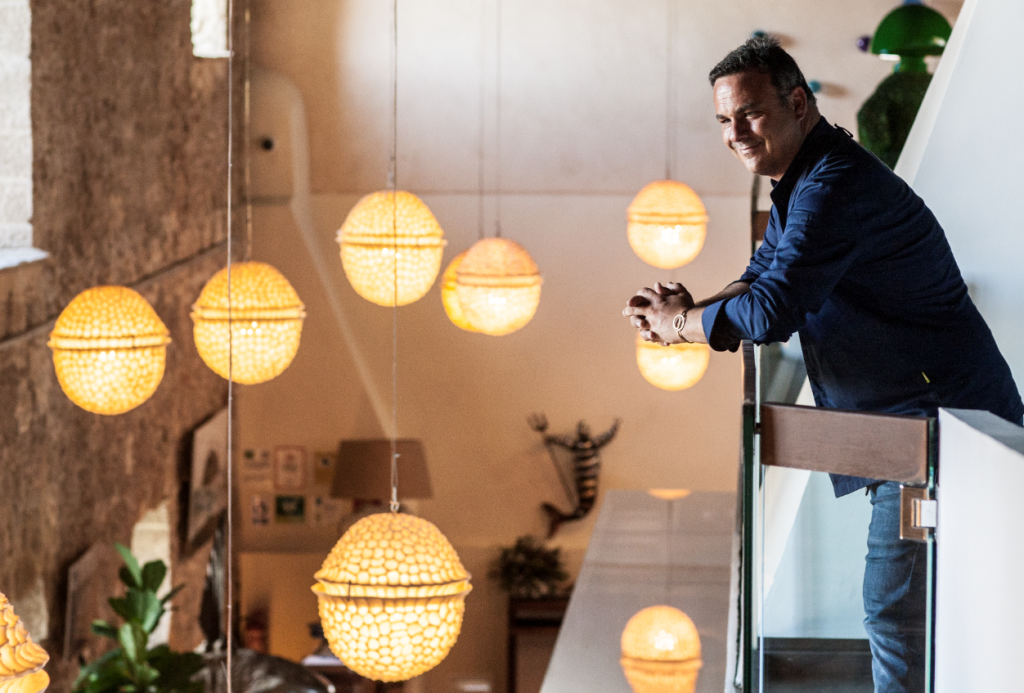
¿Nos estamos olvidando de los guisos tradicionales que
comíamos cuando pequeños?
Creo que Andalucía sigue siendo de cuchara, si bien es cierto que el mundo en general anda falto de tiempo y esa cocina es de fuego, de cariño… Hay que volver siempre a ese origen, que además representa una cocina nuestra, saludable sobre todo en los niños, y no recurrir a lo fácil y nocivo de los preparados y procesados…
Si esa reflexión nos la llevamos a mi sector, al terreno de los fogones profesionales, tengo muy claro que lo primero es manejar esos guisos, esa cocina de fondos, de verdad. Antes de hacer esferificaciones hay que saber hacer unas lentejas por derecho.
Hay kilómetros de fauna marina, pero ¿no cree usted que se
gastan pocos recursos en investigación?
Muy poco, sólo conocemos el 60% de la despensa marina. Habría que invertir muchos más recursos en conocer esa masa ingente de agua. Tres cuartas partes de la Tierra son agua, pero conocemos mucho más de la tierra que del mar
¿Qué ha significado para usted el plancton?
El plancton es sin duda uno de los proyectos más bonitos y de los que me siento más orgulloso en mi carrera. Es el sabor más puro del mar de manera más sintetizada. Es bonito ver la cara de la gente cuando lo prueba por primera vez, además da igual de donde sea, a cada uno le evoca a una cosa. Recuerdo cuando empezamos y a los clientes les dábamos un cucharón de plancton y se quedaban locos.
A lo largo de estos años, se hay ido integrando en nuestras elaboraciones cada vez de manera más natural. No hay una temporada en la que no esté presente, es nuestro signo de identidad, aunque haya otros y queden por venir muchos más. En cualquier caso, como cocinero, más que desarrollar nuevas técnicas, me emociona hallar ingredientes inéditos. Ver cómo hoy en día el plancton está presente en otras muchas cocinas del mundo me hace ilusión
¿Se pueden encontrar nuevos ingredientes marinos para alimentar a la humanidad como pasó con el plancton?
Por supuesto, y dentro de no mucho iremos desvelando cosas…
Hombre solidario, no dudó en ponerse manos a la obra con
Juanlu en el proyecto World Central Kitchen Cádiz para dar
de comer a 400 personas sin recursos en la provincia. ¿Qué recuerdo tiene de esta experiencia?
Estaba en un momento encerrado en mí mismo y en la ola que se nos venía encima, hasta que decidí que tenía que salir de mí para dar a los demás. Lo que me llevo de esta experiencia es la entrega hasta el final de todos los voluntarios. Convivimos dos cocinas, la de mi amigo y compañero Juan Luis Fernández, del restaurant LÚ y la de Aponiente, a las que se sumaron una gran lista de amigos, cada un con sus profesiones y que nada tenían que ver con la cocina… me llevo un gran recuerdo.
Como hijo de médico, ¿no es injusto a veces la importancia
que le damos a chefs, futbolistas o artistas, cuando al final
han sido los sanitarios entre otros los que se han dejado la
vida por nosotros?
Sin duda les debemos una inmensa gratitud por su entrega
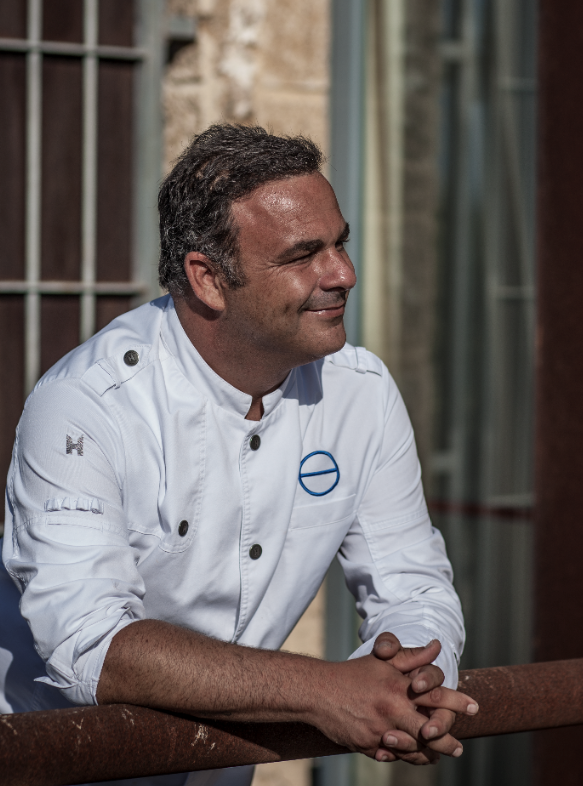
¿Cómo vivió el confinamiento?
Pasé por muchos momentos, supongo que como nos pasó a todos, de estar encerrado en mí mismo dándole vueltas a cómo afrontar empresarialmente este bache, a salir y reabrir Aponiente para dar de comer a los que estaban sufriendo en sus casas la pandemia y sus consecuencias. De no querer saber nada de los números y de cómo se nos iban los proyectos futuros a la deriva, a volver a darlo todo y resurgir para la apertura de nuevo.
¿Cómo ve la gastronomía andaluza?
Son cada vez más los que vienen haciendo un “tour” gastronómico.
La gastronomía está de moda y hemos de aprovechar el momento. Además, tenemos la fortuna de que la Guía Michelin está premiando nuestro saber hacer y se mueve mucho turismo en torno a ella. Que nuestra comunidad sume estrellas es lo mejor que nos puede pasar, al final nos retroalimentamos unos de otros.
“The sea is my source of
inspiration and my outlet from my childhood”
Ángel León, four Michelin Stars, three Soles in Guía Repsol,
with international recognition… how do you manage it to be still
a close and humble person?
I had never dreamed of having four Michelin Stars… success and
recognition are no doubt an incentive to keep on sailing. I don’t feel that they are only mine, but also my crew’s, and that is what I like more of it, the collective effort that makes this project possible.
From the beginning, we wanted Aponiente to be more than a restaurant, and its size has been increasing through the years, but we are still the same: local people who love their homeland and prefer to invest in it and stand for the beauty of Cádiz and Andalusia, when the best, easiest or profitable thing to do would have been to take our knives and sail in other seas… My connection with my family and friends, my homeland environment and reality make me have my feet on the ground and my head in the sea
How important do you consider sustainability in food?
From my beginnings in Aponiente I made a bet for discards, for instance, producing marine coldcuts which we have diversified along
the years. Nowadays, sustainability is about to become a trending topic, but in Aponiente we have been supporting it from the beginning, and trying to preserve our marine environment (marshlands, ancient tuna fishing in almadraba, salt mines…). The world must go in this direction, and we will keep on spreading the need to preserve our seas
Is nature being benign with us, in spite of the harm we are doing?
We have to be conscious, embrace the message and really change
our habits… it is an educational problem. I think that in confinement we have given nature a break that has had a positive effect.
We should value it. Nature is a gift we have to take care for. We still don’t know 40% of marine species, we shouldn’t destroy it before we know all the possibilities it could offer to us.
Do you consider yourself a sailor more than a chef? Would you
be a chef, if you wouldn’t have fallen in love with sea before?
First of all was the sea, the rest came afterwards. Sailing in my childhood with my father, my mentor in the sea and in life, awakened my passion and curiosity. I used to clean the fish we captured and by their entrails I learnt about fish and what they eat. Contact with the different fleshy parts and colours of fish awakened my curiosity for cooking. The sea is my source of inspiration and my outlet from my childhood. I was never a good student; if I had been, I would have liked to be a marine biologist
Are we forgetting traditional meals?
I think that in Andalusia we still love spoon meals, even in general people lack the time to cook with love… We have to go back to origins, to the traditional meals which are healthy specially for children, and reject the easy and harmful option of processed meals. In my profession, returning to the basis means to prefer stewed meals and traditional stock. Before making spherifications, you have to know how to cook lentils properly
There are kilometres of marine fauna but, don’t you think that
there are few resources for research?
Few indeed, we only know 60% of marine species. More resources
should be invested in knowing this huge mass of water. Three quarters of Earth are water but we know much more about dry land.
What has plankton meant for you?
Plankton is no doubt one of the prettiest and proud-worthy projects
in my career. It means the purest taste of sea in the most synthesised
way. I love to watch at people’s face when they taste it for the first
time. Wherever you come, it will bring to your mind something different. I remember when we started and clients got crazy tasting a spoonful of plankton.
Along the years, it has been integrated naturally in our meals. We
offer it every season and it is our distinguishing mark, even there
are other ones now, and other ones will come in the future. In any
case, as a cook, what moves me is finding new ingredients more than
developing new techniques. I love to see how plankton is yet present
in many other restaurants in the world.
Can new marine ingredients be found to feed people, as happened with plankton?
Of course, we will reveal some news about it soon…
As a caring man, you stepped forward to help 400 deprived people in the province of Cádiz with World Central Kitchen Cádiz,
together with the chef Juanlu. How your experience was?
I was in a self-thinking moment about the consequences of coronavirus in my business, but I decided I had to get out of myself to help
people. What I appreciate more of this experience is the dedication of all volunteers until the end. We started with two kitchens, mine and my friend and workmate Juan Luis Fernández’s, LÚ and Aponiente, which were followed by a long list of friends who came from other professions. I have a great memory of it
As the son of a doctor, it isn’t unfair to give public relevance to
chefs, football players or artists, when at the end sanitary workers and other professionals have taken pains to save lives?
Of course, we must honour their immense dedication.
How did you pass confinement?
I have passed through different moments; I suppose as the rest of
people. From being locked in myself thinking how to manage this
slowdown in my business, to going out and reopening Aponiente to
feed people who were suffering the consequences of the pandemic.
From not knowing how to deal with the projects I had to postpone,
to be back again and reopening.
What is your opinion about Andalusian gastronomy? There are
increasing gastronomic tourists.
Gastronomy is fashionable nowadays and we have to take advantage of it. Besides, luckily Michelin Guide has been awarding our good job and there is a lot of tourism around it. More Michelin starts in Andalusia is the best we can wish, because at the end we are helping one another.
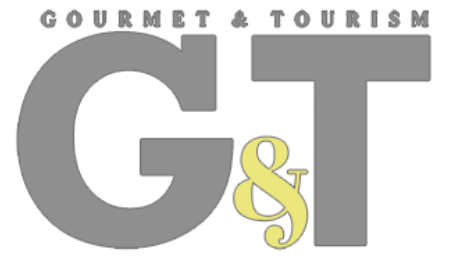


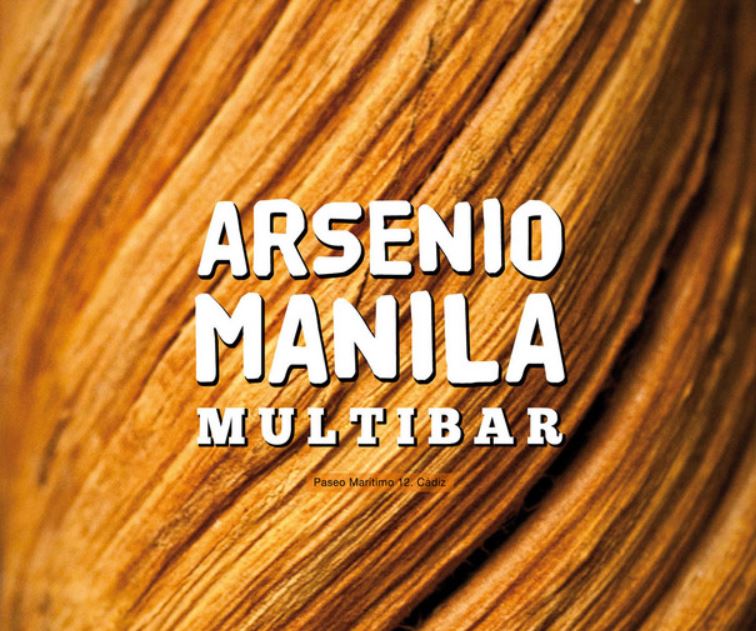
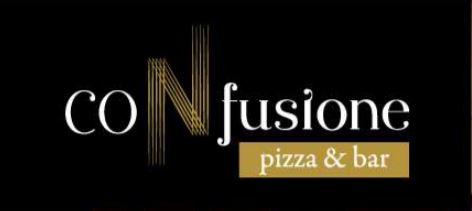
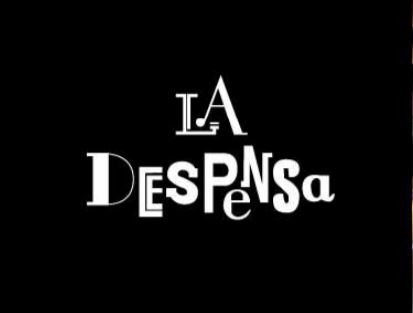








Dejar un comentario